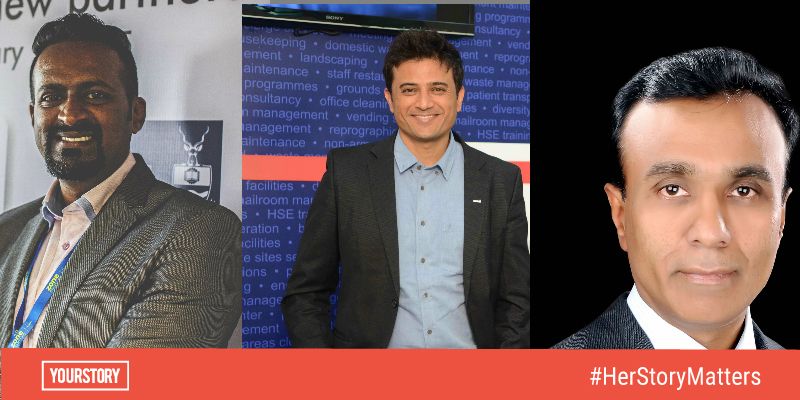The male ‘Sheryl Sandbergs’ of India, who have contributed greatly to diversity and inclusion
In the second article of this two-part series, we introduce you to some of the prized allies of the women’s movement in the corporate sphere, who have made diversity and inclusion their lives’ mottos.
In 1995, Hillary Clinton made a watershed proclamation that “women’s rights are human rights.”
In 2014, actress and HeForShe ambassador Emma Watson reasoned that feminism aims to liberate both sexes from cripplingly rigid expectations.
And ever since, numerous impassioned spoken word poetry performances have tried to appeal to your sensibilities that women aren’t “them”, and women’s rights aren’t “their rights”, rather, they’re “our” rights, our collective rights as a species.
Valuable perspective has poured in, and enough has been said about the business cases behind absorbing more women into the workforce. Among the few men who have truly internalised these powerful messages and calls to action are the following three corporate leaders, who have made diversity and inclusion within their companies and in the corporate sphere in general, their career’s motto. For International Women’s Day, meet some of the prized allies of the women’s movement:

Pradeep Chavda of Sodexo
The young-ish Human Resources Director of Sodexo India holds a master’s degree in social work and two postgraduate diplomas; one in human resources and the second in industrial relations and personnel management. At Sodexo, Pradeep leads talent management and is responsible for building a robust and sustainable culture. “It is only when you have adequate women in the formal working ecosystem, can you work on their retention and career development,” says Pradeep. In India, Pradeep has introduced initiatives such as Project Pragati, to hire more women in frontline roles; Spouse Hiring, wherein existing workers are encouraged and incentivised to bring their spouses into the company; second careers; and blind screening of resumes to ensure that men and women have access to the same opportunities.
Another novel effort to break unconscious biases surrounding certain roles, is the changing of over 300 job titles at Sodexo to make them gender neutral. For example, the title office boy or pantry boy has been changed to “office person.” To further the cause of diversity and inclusion in leadership at Sodexo, programmes such as Talent Management, Spirit of Inclusion and Diversity Champion were also implemented by Pradeep.
Mohan Sekhar of Accenture
Mohan Sekhar leads Accenture’s Advanced Technology Centers in India. In his career of nearly 30 years, he has held several executive leadership roles with global organisations in both the United States and India. Under Mohan’s leadership, Accenture’s Advanced Technology Centers in India launched a break-through programme in 2015 called the High-Tech Women Programme, to fast-track the careers of women to the role of Technical Architects.
High-performing women, who are at a mid-career level and are interested to pursue careers as technologists, are identified and supported through exclusive training and mentorship over a period of 18 months. Over 1,100 women have enrolled in the High-Tech Women Programme so far, out of which, over 250 women have already been certified as Technical Architects.
The Returning Mothers Programme, is another one of the schemes propagated by Mohan, for women at mid-career level, when the drop-out rate is steep. In this programme, every woman about to go on maternity leave is paired with a Returning Mothers’ Coach and is given specific attention to upskill and be deployed to projects upon returning to work. “Diversity is not only good for organisations and society as it nurtures purpose, accountability, trust, flexibility and innovation, but also important because ensuring equality is just the right thing to do. We are committed to attract, retain and support women employees in their career development,” says Mohan. Today, women constitute more than one-third of the 150,000 plus workforce of Accenture in India.
Ajay Ramasubramaniam of Zone Startups India
As the founding member, Director and CEO at Zone Startups India, Ajay has been overseeing the company’s growth since day zero. Situated at the iconic BSE, the company operates multiple programmes; the one initiative that gives Ajay immense satisfaction is empoWer. empoWer is India's first and only tech accelerator for women entrepreneurs. It was launched in 2016, with a hypothesis that women entrepreneurs lack programming, nurturing and a support ecosystem, which is beyond just funding requirements. Ajay looked over the selection of 15 women entrepreneurs for a six-week accelerator programme, who, in the subsequent 12 months, cumulatively raised in excess of Rs 150 crore. Ajay remarks,
"There is a lot of noise around funding of women entrepreneurs. The quality of women entrepreneurs in our country is truly phenomenal.”
Late November last year, the Canada-India Tech Summit during which they hosted a roundtable of women entrepreneurs, also led to a new programme jointly funded by Governments of Canada and India, wherein over the next few years, they will be working with a hundred women entrepreneurs from both countries, and will facilitate a fully funded exchange of 20 women entrepreneurs each year. Later in April, they are launching a global first-of-its-kind programme with an international foundation, focussed on woman entrepreneurs.
"Being kind, passionate, decisive, strong-willed are some of the innate qualities of a woman. These very qualities augur well for leadership as well; bringing about overall growth. Unless we take a stand now to support and create a fostering environment, the status quo can’t be changed,” Ajay tells YourStory.






